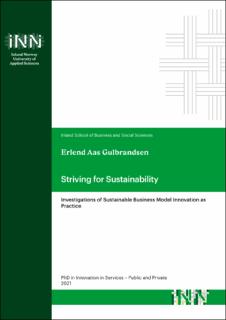Striving for Sustainability : Investigations of Sustainable Business Model Innovation as Practice
Abstract
This dissertation builds from an identified sluggishness in our collective global response to the massive environmental and social sustainability challenges we are currently facing, and from two further assertions. First, that business can be help improve the speed and decisiveness of our response to the challenges. Second, that increased knowledge regarding innovation activities for sustainability performed by established companies will help improve sustainability in business. Based on these points, the purpose of the dissertation is to contribute to richer knowledge regarding sustainable business model innovation (SBMI) activities.
The dissertation delivers on its purpose by conceptualizing SBMI as a process, and further by adopting a practice-based theoretical lens that provides a rich and nuanced perspective on the activities that make up the SBMI process. By building on this practice lens, I develop a conceptual model that describes the SBMI process viewed as practice. The conceptual model is in turn used to inform a review of the literature on SBMI, which finds that the literature offers limited knowledge on SBMI activities. Furthermore, the conceptual model is used to interpret and organize the contributions of four appended papers. Based on this, the dissertation offers findings that: (1) illuminate further what characterizes SBMI processes when they are viewed as practice, and (2) show how the application of practice theory in the research of SBMI can enrich our understanding of SBMI as a phenomenon.
The four appended papers provide knowledge on what characterizes SBMI processes when they are viewed as practice by offering new knowledge on SBMI practices, practitioners, and praxis. Paper I investigates quantitatively two aspects of SBMI practices: (1) the organization of different tasks into two types of bigger projects (“in-house SBMI” and “wider value-network SBMI”), and (2) the goal-directed, or teleological, nature of these practices. Paper II is concerned with management practices and explores conceptually how the nature and needs of SBMs by necessity will place new demands on extant management practices and potentially upheave them. Paper III provides a qualitative case study of management praxis—the situated, daily and improvised actions of practitioners—in an SBMI process. The paper finds that while top management in the studied organization had trouble juggling sustainability priorities, the sustainability performance of the organization was saved through improvised actions from
middle managers that resulted in the SBMI process exhibiting a certain degree of emergence. Paper IV contributes with further knowledge on SBMI practitioners and their daily praxis through a case study of how three practitioners work to foster engagement among their colleagues. The paper finds that the work of the practitioners took the form of persuasion praxis patterns, which were influenced by the personal histories of the practitioners and their ongoing interactions with colleagues. The findings in paper IV challenge how we should view “the selling of sustainability issues” that engaged employees or leaders must perform in order to make SBMI happen, and demonstrate the power of practice-based empirical research on SBMI.
Furthermore, the appended papers and the review of the SBMI literature taken together identify and corroborate two key themes that characterize SBMI processes viewed as practice: the complexity of the process and the centrality of SBMI to the overall project of investigating the inner workings of how to accomplish corporate sustainability and/or corporate social responsibility (CS/R) in organizations.
Through the contributions it makes with the appended papers and the dissertation cover, this dissertation offers descriptive knowledge on SBMI activities that enriches the knowledge on the phenomenon, as well as suggestions for how practice theory can inform further research. This increased knowledge moves the SBMI literature closer toward becoming a research stream that offers researchers and practitioners a strong base of descriptively grounded and practically useful knowledge on how to work with CS/R initiatives to achieve increased sustainability within organizations—something which, in turn, could help move our global society toward a more sustainable path before environmental and social sustainability problems escalate to intractable proportions.
